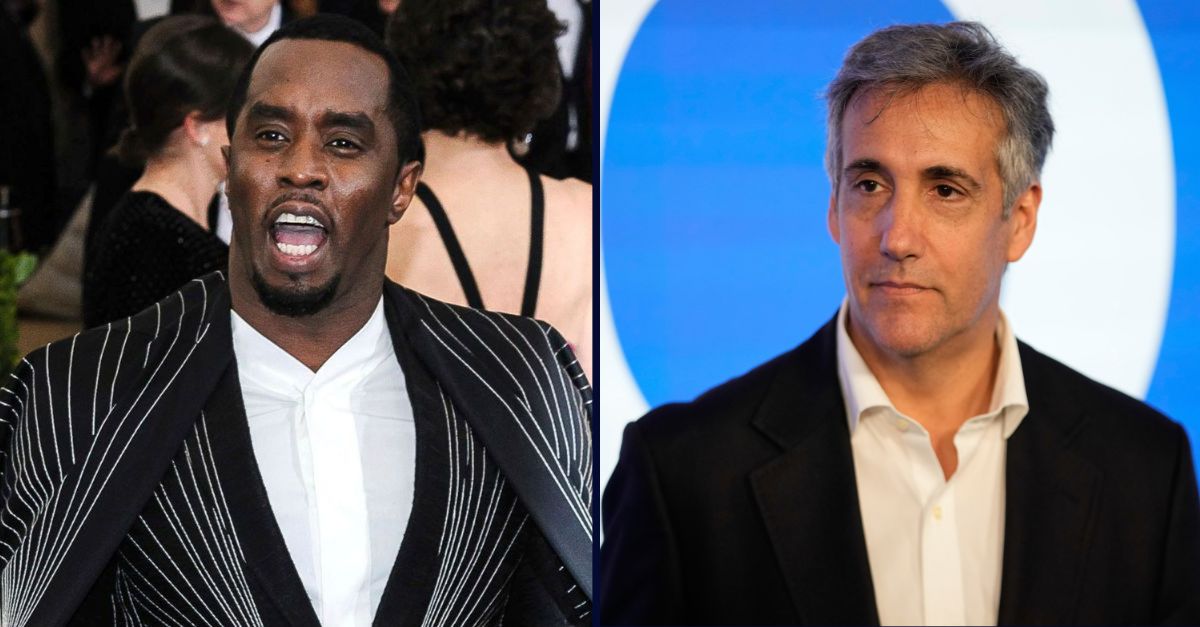
Left: File Photo by: zz/ESBP/STAR MAX/IPx 2017 5/1/17 Sean P. Diddy Combs at the 2017 Costume Institute Benefit Gala celebrating the opening of the exhibition “Rei Kawakubo/Comme des Garcons: Art Of The In-Between” held on May 1, 2017 at The Metropolitan Museum of Art in New York City (NYC). Right: Michael Cohen talks to reporters before the Democratic National Convention Tuesday, Aug. 20, 2024, in Chicago (AP Photo/Paul Sancya).
Cooperation with law enforcement and regulators is undoubtedly the most valuable way for a criminal conspirator to gain sentencing leniency. And, make no mistake, at day’s end sentencing leniency is the be-all and end-all of what motivates cooperation. It’s frankly not about a desire to make amends or demonstrate remorse.
Still, not every cooperator who is required to plead guilty gains the same leniency from cooperation. The triggering factors are typically easy to identify. First, there is timeliness: How rapid is the cooperation? Was the individual a whistleblower who brought his own criminal misconduct and that of others to the government’s attention? Or, did the individual begin cooperating before any charges were brought? Indeed, timeliness is so essential to evaluating cooperation that earlier this year, the Southern and Eastern Districts of New York, respectively, launched Whistleblower Pilot Programs to encourage individuals to voluntarily disclose information concerning certain fraud, corruption and other criminal conduct. In exchange for disclosure and cooperation in ensuing investigations and prosecutions, the SDNY and EDNY for example, would offer qualifying individuals non-prosecution agreements, thereby avoiding prosecution entirely.
Another critical factor in evaluating cooperation is determining how important the cooperator’s assistance is in convicting others. How detailed is the testimony? Was the cooperator’s information otherwise unavailable to the prosecution? Does the cooperator avoid minimizing his role or was he totally candid with the government?
Then there’s the cooperator’s courtroom performance. How is his demeanor on the stand? Does he testify credibly and forthrightly? Does he wilt under cross examination? In testifying, does the cooperator convey true regret for his misconduct?
More from Law&Crime: Judge, lawyers stunned as Trump RICO special prosecutor attacks witness who was helping them all day, opening door for new revelations
When determining the appropriate sentence, judges may also consider the consequences to the cooperator of assisting the government. For example, is it potentially physically risky given who the targets are? Has the cooperator resisted efforts to tamper with his testimony? Does the cooperator potentially face embarrassment, media scrutiny and withering criticism? Will the cooperator and his family be shunned in their community due to his public testimony? Will the cooperator suffer negative consequences that will constantly follow him?
But even a cooperator who checks all these boxes may face prison when the wrongdoing is so sensational and the loss amount, as in a major fraud case, is astronomical. This is exactly what happened to Caroline Ellison, when U.S. District Judge Lewis Kaplan sentenced her on Sept. 24, 2024, in connection with the prosecution of Sam Bankman-Fried and his stunning multibillion dollar fraud at Alameda Research and FTX. Despite acknowledging that Ellison’s cooperation was unlike anything he had seen before and recognizing that her remorse was “the real thing,” Kaplan sentenced her to two years in prison due to the high-profile nature of the case — explaining that a “get out of jail free card” wasn’t something he could, in good conscience, do, given over $11 billion in losses.
Compare this to the situation of Christopher Salamone. In August 2024, he was sentenced to time served by U.S. District Judge Katherine Polk Failla for his role in a lower-profile insider trading scheme. Salamone’s cooperation was timely, having begun after he was approached by law enforcement before any charges were filed. Notably, Salamone recorded conversations with his codefendants on his own initiative and shared them with the government. In its sentencing submission, the government emphasized that Salamone’s substantial cooperation was responsible for his codefendants — including his own stepbrother — pleading guilty almost immediately when charged.
More from Law&Crime: Two of Sam Bankman-Fried’s Associates Plead Guilty, as FTX Founder Released on $250 Million Bond at First U.S. Court Appearance
Indeed, the high-profile nature of a case cannot be discounted when a cooperator is sentenced. Returning to Ellison, the FTX case was the biggest fraud case in America in recent times, possibly in history. Judges might well have differed in sentencing Ellison. Indeed, where the government files a motion, as in Ellison’s case, seeking a downward departure from the sentencing guidelines due to the defendant’s substantial assistance, the judge isn’t obliged to grant that motion. And judges — even those in the same federal district — aren’t required to impose identical sentences to similarly situated defendants who provide the same level of assistance to the government in different cases. But given that a primary purpose of sentencing is “general deterrence,” it is naive to believe that the high-profile nature of a case won’t factor into a judge’s analysis, at least somewhat, when sentencing a cooperating witness.
The recent and splashy RICO indictment of Sean “Diddy” Combs in the Southern District of New York is, of course, a high-profile case involving a vastly different type of alleged criminal enterprise implicating sex trafficking, fraud and coercion. The same issues, though, will apply to cooperators in the Diddy case. The public record doesn’t yet show who the non-victim cooperators already are or will be, and how many will have been required to plead guilty. We can safely assume, however, that there will have been at least several pleading conspirators — and some may have entered cooperation agreements or already even pleaded guilty.
Important, though, as in every case prosecuted there, the SDNY has a firm policy of requiring cooperators who plead guilty to also plead guilty to every crime they have committed — and they must admit every crime in order to obtain a binding cooperation agreement from the prosecution. Indeed, they must admit all of their crimes, even those having nothing to do with Diddy or the sex trafficking RICO conspiracy with which he has been charged.
By the way, remember Michael Cohen — as high a high-profile investigation at the time as there ever has been? Cohen apparently wasn’t willing to plead guilty to non-Trump related crimes, and accordingly never received a cooperation agreement whatsoever from the SDNY.
However, even with all these things considered, there’s yet another consideration — the sentencing judge. Some judges are simply more lenient than others, and the type of case and the judge’s own attitudes may also inform the sentence imposed. But a would-be cooperator won’t necessarily be able to factor that into deciding whether to cooperate. For example, a whistleblower who cooperates early in the investigation (unless he has already been indicted) won’t have the benefit of knowing who the sentencing judge will be. He will, on the other hand, secure the (substantial) benefit of timely, and perhaps proactive, cooperation.
There’s undoubtedly much to think about for a would-be cooperator. It is clearly advisable to seriously consider early, earnest, and robust cooperation in the hopes of gaining sentencing leniency down the line. This is even more true where the wrongdoing is the potential stuff of blockbuster headlines like Bankman-Fried and P. Diddy, but not only cases like theirs.
Joel Cohen, a former state and federal prosecutor practices white collar criminal defense law as Senior Counsel at Petrillo, Klein & Boxer. He is the author of “Blindfolds Off: Judges on How They Decide” (ABA Publishing, 2014). He is an adjunct professor at both Fordham and Cardozo Law Schools.
Have a tip we should know? [email protected]






